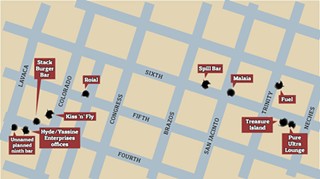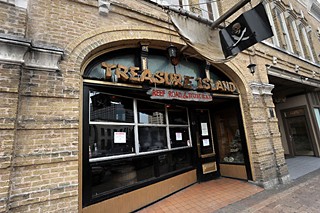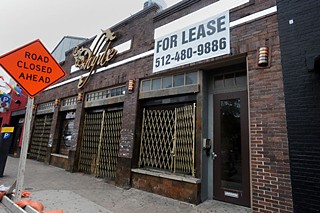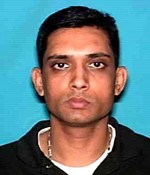The Yassine Sixth Street Noir
Legends, rumors, unpaid taxes ... and coke on the side
By Richard Whittaker, Fri., May 18, 2012
March 22 was a slow day on the News desk. This was Austin in campaign season, not Chicago during Prohibition.
And then the word came: The feds had raided a bunch of Downtown bars. Reports were vague, but this was not a polite operation. Sixth Street workers were saying the FBI was out in force and in full SWAT gear, dragging boxes out of Treasure Island and into a U-Haul trailer. That was the proverbial tip of the iceberg: Backed by a slew of acronyms in uniform – the IRS, TABC, APD, and the state Comptroller's Office – the feds were moving from bar to bar in what was clearly a targeted operation and not some random sweep. Before heading Downtown to check out the busts myself, I asked around to see if anyone in the office had heard anything.
Nothing – but then something strange happened. Without any prompting or details, someone asked: "Is it the Yassines?"
It was.
To some, the Yassines were the kings of Sixth and the Warehouse District. Theirs were the glossy, high-end, high-concept establishments – one step below private clubs, one step above shot bars. They were the men who introduced bottle service to Austin and built a shark tank into the dance floor at Qua. No one could ever accuse them of scrimping on their bars, but on the street, they were always divisive. "Too Dallas," the scuttlebutt went. Disgruntled ex-employees were suing over unpaid salaries. Kiss & Fly had a reputation for being the least gay-friendly gay bar in town. And since half the time they looked empty, how were these places making any money? The feds and the state of Texas think they know.
It's easy to turn a profit if you don't pay your taxes and deal coke on the side.
"Under the Borgias they had warfare, terror, murder, and bloodshed, but they produced Michelangelo." – Harry Lime, The Third Man
Let's recall a bit of history. Austin's Downtown club scene has not always been a virginal institution – rather, it's part of the charming outlaw legend. Take Ben Thompson, the elected city marshal in the 1880s: Before he was gunned down in a San Antonio vaudeville theatre, he lurched from war hero to felon to saloon owner to wanted murderer to peace officer. In more recent years, Clifford Antone remained the heart of the live music scene in spite of (or, some might argue, because of) his two convictions for marijuana distribution. As for run-ins with the IRS, that virtually elevates you to the status of folk hero – just ask Willie Nelson. And speaking of Willie, hunt down his 1984 movie Songwriter: Rumor has always had it that the inspiration for gun-toting, wheeler-dealer promoter Dino McLeish was none other than Tim O'Connor of Direct Events – half the club bookers in town built their Rolodexes in O'Connor's offices.
But the Yassines were a different breed on a different level – the forefathers of a new generation of upscale clubs. The figurehead was Hussein Ali Yassine: Better known as Mike, he was the founder of Yassine Enterprises and, by all ordinary measures, a true American success story. Chubby, balding, always smiling broadly in photographs, the 40-year-old Lebanese immigrant had risen from nothing, renting Downtown properties and renovating them into night clubs. He became a multimillionaire and took his brothers with him.
Mohammed Ali Yassine, aka Steve, is two years Mike's junior, but his graying temples make him look older. He has his own firm, an energy drink company called Kowabunga, but stayed close to his brother's deals. At 35, Hadi Ali Yassine is the youngest of the three and looks it. Leaner, with brown, curly hair that would never give away his kinship, he stayed in the family trade, first running Pure Ultra Lounge and then starting Famous Vodka.
It all looked perfect. They could be flashy – a common story is that they were never without their Rolexes – but that's not a crime. Under Mike, Yassine Enterprises ran eight clubs, stretching from Sixth to the Warehouse district, and had recently been picking up rave reviews for its first foray into dining, Stack Burger Bar. Last November, they'd even dropped some cash at the Austin Art Cow Auction, a celebrity-studded charity event hosted by Jay Leno. In an obvious nod to the club roots of their fortunes, they acquired "Discow," a mirror-covered grazer that they stuck on a rotating platform on the roof of Stack, creating a glitter-ball effect across West Fourth.
The clubs seemed to be surviving the recession well enough: The heart of the empire remained the desperately unhip Treasure Island, but the business itself was moving to the more upscale stretches of the Warehouse District. That was where the Yassines had their offices, and they were eyeing the vacant site at 219 W. Fourth for their ninth club. They had even made forays into the gay scene, with Hyde and Kiss & Fly. It's easy to imagine Mike in his condo at the Downtown Hilton, staring down at the empire he had built. Life looked good.
Then the IRS, FBI, APD and just about every agency with a badge raided their businesses, their houses, and their associates, and dragged them all to jail.
"It's like any other business, only here the blood shows. " – Midge Kelly, Champion
On March 27, the press corps got its first real look at the Yassines outside the lifestyle pages. That was the first day of their detention hearing in the U.S. Federal Court, Western District. The three brothers, dressed in the dreary green stripes of the Bastrop County Sheriff's office jail (where they're being held), were joined by seven of their associates and enough lawyers that visiting magistrate Judge Dennis Green had them wait their turns in the jury box. It took short, serious, bullnecked U.S. Assistant Attorney Gregg Sofer several hours just to lay out the barest bones of the government's case: In 2006, the feds recruited a cousin of the Yassines as a confidential source. For the next two years, through a series of sting operations, wiretaps, and hidden cameras, he helped the feds assemble a case that mixes up coke, money laundering, and even international terrorism. Although the defense presumably knows who this source is, his identity and current whereabouts have not been discussed in court.
While the press and the blogosphere have gone on a feeding frenzy over Mike, Steve has the most charges pending. According to the feds' indictment, Steve was the linchpin, connecting the informant with coke, and then bringing in Mike as a means to launder the money. His attorney, Stephen Orr, told the court Steve's biggest sin was that he wanted to make some money and that "he knew someone that had access to cocaine." During the pretrial hearings, Orr has hinted that this is all entrapment. Every potentially criminal act was instigated by the informant he argued, and if his client was such a risk to society, why did they leave him or any of the defendants on the streets for so long?
Then there was Nizar Hakiki, a Moroccan-born naturalized citizen and a family friend. When he was arrested, he was a risk management specialist with the Texas Facilities Commission. Prior to that, he had spent a few months in Iraq as a translator for a private security firm. When the alleged crimes were committed, he was a real estate agent with Keller Williams. It was Steve who introduced the informant to Hakiki, and then – according to the government – it was Hakiki who provided him with a kilo of cocaine. The informant told Hakiki that he was dealing up in Colorado, and he needed a gun, "a weapon that was good for the ability to hurt someone up close without causing a loud noise or a disturbance," Sofer told the court. Hakiki provided a .22 caliber pistol and later, when the informant said he needed something with more stopping power, Hakiki came up with a 9mm. The first deal, according to testimony by DEA Agent Randel Gillette, happened at Hakiki's office, the second, at Steve's house.

Around them is a circle of minor players. There's Karim Faiq, the taxi driver whom the feds paint as Steve's wheelman, and have charged with distribution of cocaine and conspiracy to distribute. According to Sofer, the first coke buy happened in the backseat of Faiq's taxi outside of Steve's house. Faiq's lawyer, Ben Florey, has told the press that it is all a misunderstanding, that his client is just a taxi driver. Then there's Amar Thabet Araf, Sami Derder, and Edgar Orsini, who are the targets of cocaine distribution charges, and Alejandro "Cueta" Melendrez, who the government claims is connected to the Texas Syndicate and threatened the informant. All of them face potentially serious sentences, but the coke and gun charges will have to wait their turn. On May 4, Judge Sam Sparks and the lawyers came to an agreement: They would deal with the money laundering case first.
"Follow the money." – Deep Throat, All the President's Men
A case this big, with this many defendants, is actually a series of cases. With 10 defendants, five different prosecutions, hours of video and audio, 500 boxes of seized documents, and transcriptions from both French and Arabic, there's no way all this will be handled in one quick trial. So the court will first address the cash. With jury selection set for Oct. 1, that means a lot of people on bond for months, waiting to see which way the dominoes fall.
According to the government's case, after accepting the coke and handing it to the feds, the informant was holding a big stack of cash, supposedly from dealing in Colorado, but really from the feds. So he approached the Yassines about how to handle it all. That's where Mike and his executive assistant Marisse Marthe Ruales come into the picture. According to the feds, they not only came up with the idea of laundering the cash through Yassine Enterprises, but they also walked the informant through the nuances, cut checks, and even proposed setting up a fake cleaning company so they could filter payments through to the informant almost indefinitely. Allegedly, they then literally handed little brother Hadi $100,000 from the bag of coke cash to put directly into startup costs for Famous Vodka.
But it's not just illicit money that the feds are looking at; the legal revenues of Yassine Enterprises are causing consternation as well. Each of their bars was run through a separate corporation – a pretty standard technique to ring-fence liability. However, it looks as if someone may have been pretty good at cooking the books. Like many bars, they used the computerized Aloha point-of-sale system to place orders and track customer tabs (only Fuel and Treasure Island still used cash registers). All the receipts and records from all those machines became part of those 500 boxes of documents seized during the raids, and the IRS and the Comptroller's Office have been trawling through them. So far, an early analysis by IRS Special Agent James Neff reflects that the Yassines underreported their gross receipts between 2005 and 2010 by at least $7 million. That figure, he told the court, could actually be as high as $10 million.
On April 24, the Comptroller's Office froze all the family's private and business accounts, placed the clubs under full seizure, and started pulling out everything that wasn't nailed down. If the state's numbers are right, Mike's firms owe the state $426,605 in sales tax, plus another $1.52 million in mixed beverage taxes. Throw in penalties and interest, and the state is looking for $2.48 million. Selling whatever bar fixtures and leftover booze they seized may take a bite out of that debt, but there's a hitch: Turns out that the IRS is looking for $2.5 million in unpaid back taxes from the Yassines. Mike cut them a check for $134,000 in 2009, but that bounced, and according to testimony by IRS Agent James Neff, he reportedly has still not paid the $250,000 he owes for 2010.
Much of the Yassines' empire seems to have been built on sand, and their personal finances were little better. According to the feds, Steve may have been driving a Maserati and a Humvee, but he hadn't filed a tax return in four years. It's a similar tale with Mike: He didn't even have a personal bank account in the U.S., instead using the clubs to pay his personal expenses. Hell, even the University of Texas diploma on his office wall was a fake. (His attorney argued that, even if that's true, it's not a crime. "There's a bunch of Longhorns that might disagree with that," Judge Green replied.)
The feds will want their cut first, but they're not the only people in line. Sparks is no stranger to the Yassines because he's also hearing a class action lawsuit brought by 200 or so former bar workers. According to that suit, Yassine bars, including Qua and Fuel, had a bad habit of not paying their staff, instead letting them get by just on tips. Unfortunately, that's not exactly legal: If the firm had filed the proper paperwork, then they could have paid their tipped workers less than minimum wage, but the suit alleges that never happened. Sparks has ordered the parties to reach some kind of scheduling agreement by mid-May, but with the state and the IRS looking for millions in unpaid taxes, those employees will be hard-pressed to get the back pay they believe they deserve.
"I'm shocked – shocked! – to find that gambling is going on in here!" – Captain Renault, Casablanca
So if all this was going on, how did no one know it?
Well, there's a big difference between suspecting and knowing. In fact, for many people, the Yassines were model businessmen. The court records are filled with letters from employees and character references imploring the judges to release the accused on bond. They were major employers, and jailing them left 150 to 200 workers without jobs. For others, they were like Sixth's notorious Midnight Cowboy Oriental Massage: the worst-kept secret, but everyone kept mum until March 2011, when the cops kicked down the door and charged owner Chong Lee Rogers with aggravated promotion of prostitution.
No one expects club owners to have spotless hands, and the Yassines had their share of legal troubles. Most were standard fare. In 1999, they were sued by Joe Hand Promotions – the company that provides closed-circuit pay-per-view boxing and UFC events to bars – and then in 2007 and 2008, ASCAP went after them for unpaid royalties. Add to that the fury of PETA over the sharks and stingrays under the dance floor at Qua, and things look rough but not out of the ordinary. However, both Judge Green and Judge Sam Sparks consider the three principal men severe flight risks, with family overseas and an unknown – but in theory large – amount of cash sloshing around in foreign bank accounts. Yet that decision may be out of the judges' hands; even before these arrests, Steve was fighting a deportation order, and Mike is suing the U.S. government for the slow-motion handling of his citizenship request.
The legal scrambling has caused inevitable Downtown shock waves, even among the oldest and most unflappable of the old guard. Carl Daywood is a Sixth Street institution, proudly proclaiming a life spent living and working on the street as a Realtor specializing in bars and clubs. He rankles at the commonplace slur "Dirty Sixth" and voiced amazement about the accusations against the Yassines. Sixth Street, he said, is a neighborhood, and everyone knew and liked the Yassines. "The number one thing is shock," he said. "All of us were shocked that this came up."
All? Not precisely. Ask Fred Schmidt of Wild About Music about the Yassines, and he pulls no punches. He said, "There's been no surprise. It's just been, 'Wow, what's taken so long?'" Neighbors have opposed the Yassine liquor licenses for years, and back in 2002, Treasure Island was on a list of seven bars busted when TABC found falsified information on license applications (see "Bars, or Behind Bars?," Feb. 1, 2002). Schmidt does not mince words about Daywood, either. He said, "Half the time, I just don't know what planet Carl is on." He argues that, as a member of the Downtown Austin Alliance security and maintenance committee, Daywood should have known about the problems. "That's the group that APD and TABC and everybody goes to and says: 'Hey, this is a problem operator. What do you guys think?'"
"You're dead. Lay down." – John Kellogg, Johnny O'Clock
The money laundering and coke allegations will at least see their days in court. But what about all the other wild, swirling stories? Three months ago, Mike Yassine was just a club owner with a few civil suits and a couple of rumors dogging him. Now every little accusation, proven, unproven, unprosecuted, or just accelerated over a few drinks, is part of the public record and the sensationalized news cycle.
Nothing caught fire like the headline claims about Hezbollah, the Lebanese political party and militant group. Only problem? There's no substance. During the initial detention hearing, Sofer made a passing reference to a moment in the raid on Mike's house. According to Sofer, the Yassines' father was there and told the FBI that the boys' uncle, Mohammed Ishmael, was in Hezbollah. So far, the feds have done nothing more to claim a connection to terrorism; sources close to the family say the feds have it backward, and that in fact, far from being a Hezbollah supporter, the senior Yassine was afraid of them – they had blown up his house. But that one little reference by Sofer, inflated by sensationalist reporting, has become fuel for right-wing, anti-Islamic conspiracy websites that connect anyone with dark skin and a little bit of cash to global jihad.
What no one doubts is that the Yassines had plenty of money and were sending some of it to Lebanon. That's not exactly shocking. After all, their mother and uncle still live there, and Mike is generous when it comes to his family. In court, federal prosecutors said he was basically giving Steve a $9,000 a month stipend when his regular job distributing Kowabunga didn't cover the bills. He would hardly be the first American immigrant to send cash home.
So far, there is no indication that the IRS is currently pursuing other illegal activities beyond failure to file. The only eyebrows raised are about how much money there was, how vague the money trail is, and how much more cash could be floating around. Aside from $45,000 in checks to his uncle, Mike had bought his mother a $700,000 house in Beirut, and the IRS is trying to crack the almost-impossible nut of transfers among Swiss bank accounts.
Was there a crime? Maybe, maybe not, but there's no sign yet of the feds bringing any charges relating to illegal international cash transactions or terrorism. That's also true of the old but persistent rumor that Mike was connected to the 2000 disappearance of his business partner, Paresh Patel (see "Dancing About Architecture," Oct. 6, 2000.) Again, the rumor mill has been running fast for years. One story was that Patel, last seen with $15,000 in cash, disappeared back to his native India to avoid debts and lawsuits. But the circumstances of his disappearance – his Lexus abandoned in East Austin, the fact he never picked up his two young sons – suggested foul play. There was a wild and unproven rumor in 2004 that the Texas Syndicate killed him and buried him under the Buda H-E-B – a rumor H-E-B denies – and Sixth Street scuttlebutt followed that trail back to Mike's door. That has been given some potential credibility after confirmation from the Austin Police Department that the cold case homicide unit regards him as a "person of interest." But there's been no prosecution, just as there is no prosecution to date concerning allegations that Ruales engaged in witness tampering in Williamson County. Prosecutors have raised all these issues in court, but there are far more headlines than actual charges. The occasionally irascible Sparks has already started to fulminate on the more sensational reporting.
For now, that may be the biggest problem for the Yassines. Even if the coke and money laundering charges collapse, their bars have been seized and liquor licenses suspended, their professional reputations shredded, and the state of Texas is already pulling millions from their coffers. That's all before the IRS finishes looking into their finances. The consensus is that, whatever happens in court, Yassine Enterprises and all its affiliated companies are done.
The next question for Downtown is: Who takes their place?
"Forget it, Jake. It's Chinatown." – Walsh, Chinatown
Sixth Street abhors a vacuum. "I've got inquiries every day, people looking for locations," Daywood said; he has little doubt that the old Yassine properties will go fast.
What kind of tenants? That's where Schmidt and Daywood butt heads. The pair are not exactly best buddies, having sparred over control of the 6th Street Austin Association (see "Fork in the Road on Sixth Street," Nov. 25, 2011). Ask Daywood what the street means and he talks about the night life, the bars, live music, and restaurants. Schmidt wonders what's supposed to happen during the daytime and pushes for more retailers. It's not just a personal fight: The pair represent differing factions of the Downtown community, and there is little doubt that each side is eager to take the nine prime pieces of real estate vacated by the Yassines off the market. There are already renters eyeing some of those spaces, and the Downtown Austin Alliance has a retail recruitment program in place to bring what Schmidt called "a more balanced mixture" to Sixth. "This is what we wait for," he said. "When there's any change in lease, that we can hopefully intervene and say, 'You know, this is a great opportunity to think about change in use.'"
By sheer numbers, the bars have the upper hand on East Sixth. Over at the Downtown Austin Alliance, Associate Director Molly Alexander is looking at 71 storefronts, and 54 of them are single-serving bars. She's actively recruiting new tenants to fit the DAA's view of an 18-hour-a-day, seven-day-a-week street, and with five Yassine bars either on or near Sixth, that's a lot of desirable real estate up for grabs. For her, shifting the balance over to retail won't cut the amount of money that's spent in clubs: Add more stores, she said, "and the bars that remain will do incrementally better." She has a list of clients lined up, waiting to diversify the street, and some of them may be interested in the old Yassine properties, but the legal wrangling and the seizures mean they're stuck revving their engines. Plus, no one is sure exactly what the existing leases look like, whether the Yassines were renting directly or were subtenants. "We just don't know what the time frame is, how long things will be held up, how long the lease is – we just have no idea," Alexander said.
The first club has already gone, but not the way Schmidt might have liked. Spill is on the way to becoming Bourbon Girl, another part of the expanding Carmack Concepts empire. That's the bar firm owned by the Womack brothers – Chad, Wes, and The Bachelor star Brad – and their business partner Jason Carrier. According to Chad, their plan is to tap the growing convention market with a high-end bar. There's no malice against the Yassines – in fact, Chad points out he used to work for them and they were business neighbors for years – it's just business. Developer David Kahn owns the Spill property, and he quickly evicted the Yassines. He already rents properties to Carmack, and since their two signature bars – Chuggin' Monkey and Dizzy Rooster – are right across the street from Spill, it's a natural fit. "We wish, frankly, that David would slow down just a bit," Schmidt said.
Not that he's opposed to bars on Sixth; his mixed-use model for Sixth requires bars. What he wants out are the "bad operators [and] the low-hanging fruit," the bars that are flipped every six months by overambitious college kids with too much cash and no brains for business. In their place, he'd like to see a mixture of retail, restaurants, and bars. Take Midnight Cowboy, run by his friend Tim League of the Alamo Drafthouse. A year ago, it was the butt of drunken snickering about happy endings; now it's a high-end cocktail lounge whose website plays up the building's history of "licentiousness."
That's an old tension – between a Sixth Street that loves its dangerous history and a Sixth Street that runs the risk of repeating it. It's a fight that started long before the Yassines arrived, and will go on long after they drift into Austin legend and lore.
Got something to say on the subject? Send a letter to the editor.















